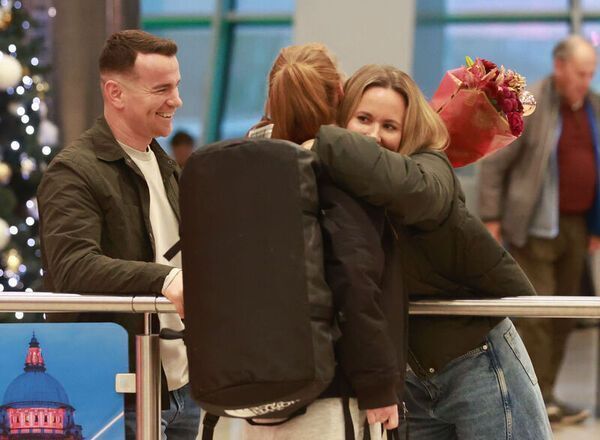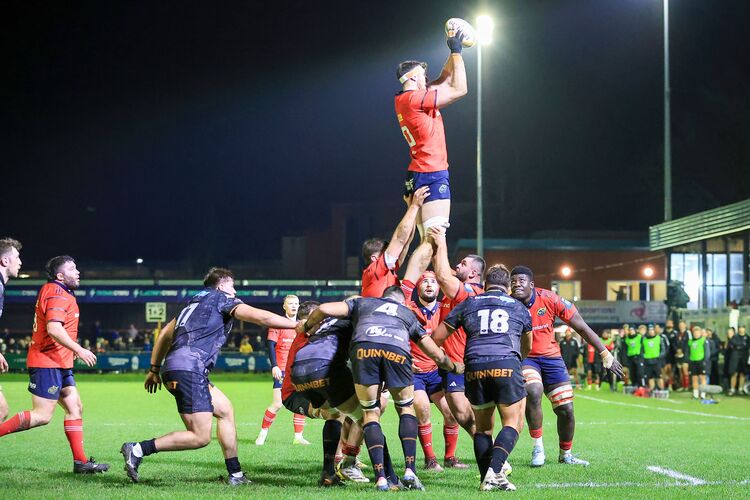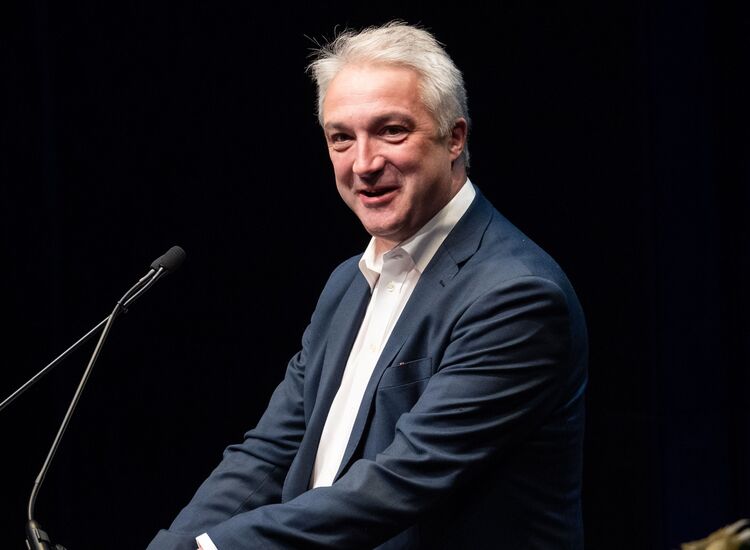Gardiners Bay, Long Island, N.Y.
In this extract from his yet-to-be published novel “Long Night’s End,” Jim Rodgers says: “Johnny Gunn takes the subway out to Rockaway Beach to see his widowed father, a man who has never wavered in his morality. Johnny has not only wavered but fallen. His marriage is in tatters, his drinking uncontrollable, and the other woman in his life is in trouble. He hopes the visit with his father and the swim in the ocean will clear his head.”
Rodgers is married with two children and lives in Manhattan. He’s an attorney and a writer who “continues to find inspiration in the rough swells of the Atlantic Ocean.”
By Jim Rodgers
The A train weaves its way through Brooklyn and into Queens. It crosses Jamaica Bay on a thin strip of land and for a while it is like traveling over water. At Broad Channel station, in the middle of the bay, the train stops and passengers switch to another branch of the line that goes on to Rockaway Beach.
It is a Sunday morning in late July and the subway car is packed with New Yorkers anxious to jump into the surf. There are families of many nationalities. There are young guys with surfboards and couples with tote bags and the Sunday newspapers. It is what you might expect to see when apartment dwellers decide to go to the beach. City folk desperate to get out of the swelter of the streets and knock themselves out with the sand, salt water, beer, hot dogs, soda pop, and ice cream. In the evening these same people will go back to their neighborhoods wrung out, but filled with some satisfaction that they fled the city and ventured to the ocean, even if that ocean is part of that same city.
Today the people are fresh and excited for the day, like pilgrims seeking the promised land. For me, it is a visit to my father without the family and without my Volkswagen. I get off the subway at the end of the line and walk the sidewalks of Rockaway Beach. The side streets are where the old cottages can be found. Some of the cottages have been rented for the summer to young, single guys and now resemble frat houses recovering from a Saturday night bust up. My father’s cottage is one of the older ones but well preserved with a wrap-around porch and an Irish flag fluttering in the noontime breeze.

Jim Rodgers, third from left, with his brother and some members of the family’s next generation in the Atlantic Ocean.
I find my father in the kitchen making sandwiches for lunch. He smiles and motions for me to sit down. I notice the usual Schaefer beer has been replaced with a pitcher of ice tea. Means he’s been talking to Rose. Just as well as I tied one on last night at the Keltic and am working through the hangover.
“Rose and the kids were here last week,” he says.
“Great, Dad. They get to the beach?”
“Oh yeah, you know your Ellie, like a dolphin.”
“That she is,” I say.
“They need you back home, Johnny.”
“Come on, Dad, let it go.”
“Why should I let it go? You’re my son. Those are my grandkids. Besides, Rose and you love each other. It’s obvious.”
“It’s complicated,” I say.
“You say that like I’m some kind of simpleton.”
“I didn’t mean it that way.”
“Well it came out that way. Problem with your generation is you think your parents grew up in la-la land.”
“Well, you do have a certain clear-cut outlook on life.”
“Not always. Not when I was your age. Believe me, your mother and I had our share of problems.”
“I never knew.”
“Why should you have? In those days couples kept it to themselves.”
“Much better that way,” I say.
“I’m not sure it was better. It was just the way it was.”
“Regardless, I’ve screwed up things real good and Rose doesn’t want me back.”
“You have to want back.”
“I do.”
“You sure?”

Cape Cod Bay.
I look at my father. His question stops me cold because it is one I have never really asked myself and it gets to the truth of the matter. Of course he doesn’t know about Molly. He might suspect but it is not something he would bring up and it is not something I would volunteer. That type of thing belongs in the confessional, to my father’s way of thinking. Given the alternative, that is, talking to my father about it, I can’t say that I disagree with that approach. I still haven’t answered his question about whether or not I want to be back home. I let the question die and finish my sandwich. There is a knock at the front door.
“Ah, that must be Father Jim,” he says.
“Father Jim?”
“Yes, I invited him out for a swim.”
“Just a coincidence, Dad?”
“That’s all it is.”
Father Jim is all smiles. He has the look of a man who wrestles nightly with the devil and his fingers are still stained with nicotine, but he seems happy to be out here.
At the beach the three of us settle in the beach chairs. Father Jim is as white as white can be and is even skinnier in the flesh than his clerical garb reveals to the parishioners. He wears a madras bathing suit that looks inherited from his father, or maybe his grandfather. When he stands to walk to the ocean his form cuts a figure circa 1962. My father and I join him at the edge of the surf. Father Jim and I light up and my father dives into the ocean. Father Jim takes a long drag and then speaks.
“You’re in trouble, Johnny.”
“In what way, Father?”
“In every way.”
“That’s perceptive. And very informative. You’ve given me a lot to work with.”
“You don’t need me to tell you that you’re in trouble.”
“Okay then, what’s the solution to my trouble? You tell me.”
“You think I have all the answers? Half the time I don’t even know the questions.”
“Come on, Father, you always have all the answers. You know, rebirth and renewal and all that.”
“It’s what Rose needed to get through. To survive. I wish you both could have felt the same way.”
“Maybe Rose has gotten through, I’ll agree to that. But not me.”
“Why not work on it a bit.”
“I have been. It’s just different than your way.”
“Not working though, is it?” he says.
I take a drag of my cigarette and exhale. I look at Father Jim. He’s looking out to sea, where my father is floating in the rollers and waving for us to come in and join him. I don’t answer Father Jim’s question. Instead I put out my cigarette and say, “Come on, Father, let’s see what you’re made of.”

On the edge of the Atlantic.
We swim out to where my father floats. Father Jim has a swift and powerful stroke which surprises me. It turns out, Father Jim explains with a smile, that he spent his college summers as a lifeguard at Jones Beach. I have to admit that I’m impressed. For such a skinny, pale and nervous type, the priest seems to have some steel to him. The three of us spend the better part of an hour swimming, floating and body surfing and my hangover disappears with the tide and for a short while I feel whole again. We return to our beach chairs and Father Jim lathers himself with sun block and puts on a floppy hat. Looking at him now it is hard to believe the swimming prowess I just witnessed. I can tell that Father Jim is happy. My father, brown as an Amazonian, reaches into the cooler and grabs two cans of Schaefer. He flips one to Father Jim. They both pop the cans at the same time―two men who know they can enjoy a beer without overindulging.
The sun peaks and the late afternoon arrives, bringing with it a relief from the blazing heat and a silence broken only by the sound of seagulls landing on the now empty lifeguard stand. Soon we make our way back to the cottage, where my father has planned to boil crabs in the Schaefer beer. Father Jim seems quite excited at the coming feast and he rubs his hands together with anticipation. He lights up a cigarette and pops open a can of Schaefer. The sounds of Erroll Garner playing the piano can be heard from the CD player in the kitchen. I see that Father Jim’s spirit and body have been rekindled by the ocean breeze and the salt water, and by the music and my father’s boiled feast. I think he and my father will talk theology over the meal, and, I think, perhaps I will only inhibit that exchange of ideas. Over both their protests I beg my leave with a half-assed lie that I have big doings in the morning at the agency. Finally, their guilt assuaged, they permit my departure.
I arrive at the train as it sits on the track awaiting the call of the dispatcher. The sun is setting but the light remains and families rush down the platform to board before the train pulls away. The train sits at the end of the line, so the car is not completely full. Before the train gets to Broad Channel it will make three stops along the beachfront elevated tracks and by the time we cross Jamaica Bay the car will be full. I stand because I know the families will be boarding with small children ready to fall asleep when the subway car begins to roll and gently rock.

Cape Cod Bay.
The train stops at each station and the families step into the car, excited and animated about their day at the beach. The excited noise lasts through the switchover at the Broad Channel station. We then continue across the bay for the journey home and the car slowly begins to go quiet. By the time we make the loop westward at Rockaway Boulevard the people have settled into a sleepy, ocean-drugged state. The setting sun and the change from sunlight to the lights of the subway car have brought all of us into the evening, and if we were outside and in the country, the fireflies would be out and the crickets would be singing their nightly symphony. Even without the fireflies and the sound of the crickets, the summer evening exists here in this subway car and I feel good.
The families are the working class that make up the city, mostly Puerto Rican, Dominican, Haitian, Mexican, Jamaican. One hundred years ago the families would have been Irish, Italian, German, Polish, Russian. The faces I see now are browner but the same―that is, tired but full of love and passion, a love for their kids and a passion for the new world. A simple love of life. I am glad that at this moment I am sober and I can see this. I am glad that I took the train and not my VW―which Rose has anyway―as I would not be observing these people. These must be some of the people Father Jim has served in his years as a parish priest. There is something of these people that is drawing me out of myself. Something I cannot quite explain, but it is powerful.

Great blacked-back gull, Cape Cod Bay.
The train begins to make its stops―Euclid Avenue, Van Siclen Avenue and into East New York. Some families depart, the parents picking up their sleepy kids and their beach bags and retreating back into their neighborhoods. Next is Broadway Junction, into Bushwick, Bedford-Stuyvesant, westward and onward through Crown Heights and Flatbush, Nostrand Avenue, each stop discharging the flotsam of the world, the people of the world, the people of New York. Westward ho to Borough Hall and Brooklyn Heights, where the humbled gentry step off the train with their canvas tote bags and bronze tans, then under the East River and into Manhattan, where at Fulton Street I switch to a northbound line for the brief journey to Ludlow Street, where a hundred years ago the flotsam of Europe did live and love and suffer and did laugh and cry and dance and play, and did cook and clean and work, and did pray that one day their long held dreams would come true and their children and grandchildren would rise from the dirt and the grime and the crowding and the smell of garlic and fish and of boiled potatoes and cabbage, and the evil of the landlords and the Black Hand and the corrupt cops and the unsterilized doctors and the superstitious midwives, and that those people, those children, would someday realize the American dream.
The photos by Jim Rodgers, except the family group (Laurie G. Rodgers), the window at Cape Cod Bay (Karen Rodgers) and the great black-backed gull (Christopher Brenner).








